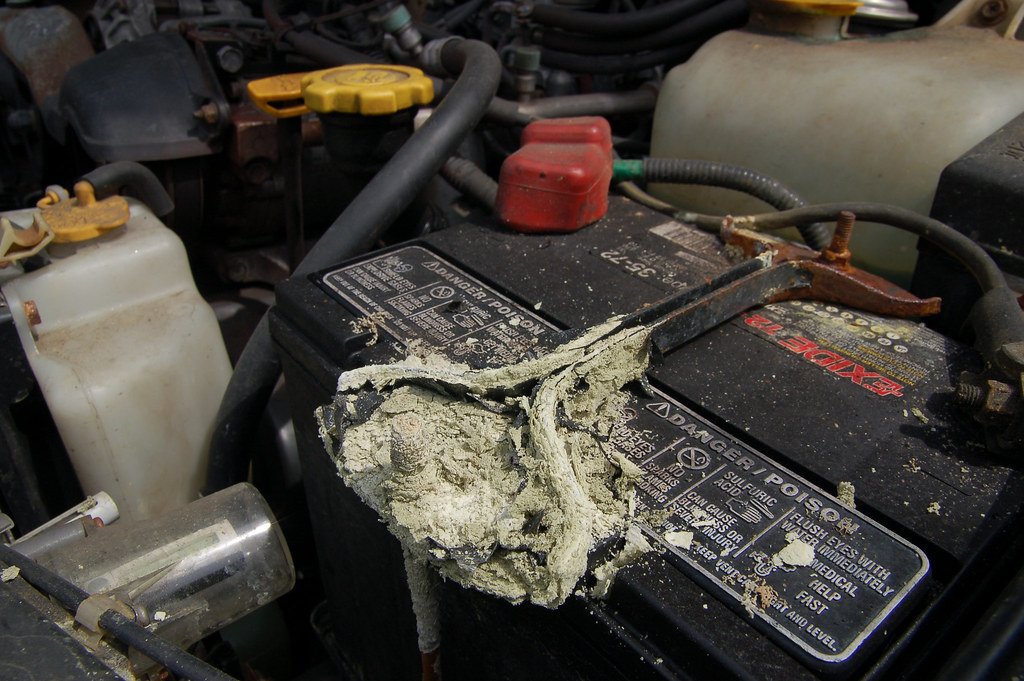Last Updated on March 20, 2023 by Ryan
Car battery corrosion is caused by an accumulation of sulfates and other acidic compounds on the terminals of a car battery. This build up can be caused by a variety of factors, including regular exposure to heat or cold, extended periods in storage without being used, and improper charging techniques. The sulfuric acid within the electrolyte solution that powers the battery will react with metal components and cause corrosion.
Corrosion occurs when electrons are removed from metals due to chemical reactions with the surrounding environment. In this case, electrons are taken away from the terminal causing oxidation which eventually leads to rust formation. Corrosion can also form if water condenses around the positive terminal through normal temperature fluctuations over time or due to leaking coolant into it.
Additionally, dirt buildup and poor connections between parts can create a current imbalance on both terminals leading to further corrosion buildup over time.
Car battery corrosion is a common problem for drivers, caused by the reaction of sulfuric acid and oxygen from air. The positive terminal on the car battery is typically more prone to corrosion because it has higher energy levels than the negative terminal due to its position in the electrical system. In addition, any leak or spill of electrolyte can cause an electrochemical reaction that leads to corrosion at this connection point.
To prevent corrosion build-up, make sure you inspect your terminals regularly and clean them with baking soda or other specialized products when necessary.
Why do my Car Battery Terminals keep Corroding?
Does Battery Terminal Corrosion Mean the Battery is Bad?
Battery terminal corrosion does not necessarily mean that the battery is bad. Corrosion on a battery’s terminals can indicate that there is an issue with the charging system or connection, but it may also be caused by environmental factors such as humidity and temperature changes. It is important to inspect your vehicle’s battery regularly to identify any signs of corrosion, as this could affect its performance and also lead to further damage.
If you do find corrosion, then you should clean it off before testing your battery voltage level with a multimeter – if the reading falls below 12 volts then it’s likely time to replace the battery.
Can a Bad Alternator Cause Battery Corrosion?
Yes, a faulty alternator can cause battery corrosion. When an alternator is not functioning properly, it can lead to an accumulation of sulphuric acid around the terminals of the battery. This acid buildup can corrode and damage the terminals and lead to increased resistance in electrical systems, causing further problems with the car’s power system.
It is important to have your alternator inspected regularly so any issues can be identified before they cause serious damage or corrosion.
Does Corrosion on Car Battery Mean It Needs to Be Replaced?
Yes, corrosion on the car battery typically means that it needs to be replaced. Corrosion is a common sign of age and wear, which can cause decreased performance and lead to total failure of the battery. When corrosion appears on the terminals or posts of the battery, it has likely been caused by leaking acid from inside.
This acid will corrode away at metal components and eventually damage them beyond repair. As such, if you notice corrosion on your car’s battery, it’s best to replace it as soon as possible in order to avoid further damage down the line.
Will Battery Corrosion Stop a Car from Starting?
Yes, battery corrosion can definitely prevent a car from starting. Corrosion is caused by the acid in the battery leaking out and corroding away at the metal components of the vehicle. This corrosion causes an increase in electrical resistance and impedes current flow.
If left unchecked, corrosion can cause permanent damage to terminals and wires, as well as interfere with your starter motor’s ability to properly turn over your engine. It’s important to check for signs of corrosion on a regular basis and clean any build-up with baking soda or neutralizing agents before it becomes too severe.

Credit: aamcominnesota.com
Blue Corrosion on Positive Battery Terminal
Blue corrosion on the positive battery terminal is caused by a chemical reaction between certain metals and battery acid. This blueish-green crusty material can build up over time, reducing the power output of your car’s electrical system. In order to prevent this from happening, it’s important to keep your battery clean and free from dirt and debris in order to ensure that your vehicle operates properly.
What Causes Car Battery Corrosion on Negative Terminal
Car battery corrosion on the negative terminal is caused by a build-up of sulfation, which occurs when sulfuric acid in the electrolyte reacts with lead plates inside a car’s battery. As sulfation builds up, it can create an acidic environment that corrodes metal terminals and cables attached to them. To prevent this from happening, regularly check your car’s battery for any signs of corrosion and clean off buildup as soon as possible.
Additionally, inspect your terminals and wires periodically to make sure they are properly connected and free of corrosion.
Corrosion on Battery Terminal And Car Won’T Start
If your car won’t start and you notice corrosion on the battery terminals, there is likely a connection issue between the battery and the starter or other components. Corrosion of the terminal can cause resistance in the electrical flow, which can prevent current from reaching necessary parts to get it running. Cleaning off the corrosion and ensuring good contact with all connectors should help resolve this issue.
Conclusion
Overall, corrosion on car batteries is a common issue that can cause serious problems if not addressed. The most important factor in preventing battery corrosion is keeping the terminals clean and free of dirt or moisture. In addition, checking the electrolyte level and ensuring it’s at an appropriate level for your vehicle will help reduce battery corrosion.
It’s important to have regular maintenance checks done on your vehicle to ensure all parts are functioning properly, including the battery terminals. With adequate care you can avoid corroded car batteries and get many years of reliable service from your vehicle!



